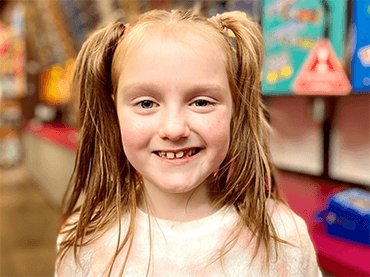At UPMC, patient care is at its best when primary care providers, specialists, and surgeons collaborate to share their expertise and insights at every point of care.
For several years, George Loose, DO, a UPMC family medicine doctor in Annville, Pa., had been monitoring Averee, a bubbly and energetic 6-year-old, for a heart murmur discovered at birth. The family was told the murmur would probably disappear as she grew older, but it needed to be checked regularly.
In August of 2021, Dr. Loose heard something that didn’t sound right and referred Averee to Adam Seitz, MD, a pediatric cardiologist at the UPMC Heart and Vascular Institute in Harrisburg.
“It just didn’t sound like the typical, innocent murmur that we hear every day,” says Dr. Seitz. “I knew something was wrong, but we needed to learn more.”
Dr. Seitz ordered an on-site echocardiogram.
“Dr. Seitz was able to show me the results on his computer right away,” recalls Bernadette, Averee’s grandmother. “I tried not to cry when he said Averee could need open heart surgery.”
Dr. Seitz diagnosed Averee with a rare condition called cor triatriatum, which accounts for less than 1% of all congenital heart problems. A thin membrane with a small hole had formed an extra chamber across her left atrium, which slowed down the blood flow from her lungs to her heart.
“A change in a child’s heart murmur can be a sign of a more significant heart abnormality, like cor triatriatum. It can sometimes go unnoticed until patients reach their teens or adulthood,” says Dr. Seitz. “Dr. Loose made a great call when he heard a change in her heart and referred her to us.”
Over time, cor triatriatum can lead to increased pressure in the lungs and cause irreversible damage. Untreated, patients may need a heart or lung transplant.
“Pediatric heart patients in central Pennsylvania can be tested and evaluated close to home so there’s no need to travel far. That includes any diagnostic ultrasounds or echocardiograms that might be needed, as well as advanced testing, such as CTs and MRIs,” says Dr. Seitz. “Our technology allows us to share results with cardiac specialists at UPMC Children’s Hospital of Pittsburgh for an almost instantaneous evaluation.”
When it was determined an operation was needed, Dr. Seitz and his team helped arrange Averee’s surgery at the Heart Institute at UPMC Children’s.
“When we received Averee’s tests, we conducted a surgical conference with everyone involved,” explains pediatric cardiac surgeon Mario Castro-Medina, MD, who performed her surgery. “Together, we discussed our findings and recommendations. We then agreed to the best possible plan from both a medical and family perspective. It’s a very collaborative process where everyone’s expertise is invited and considered.”
“In pediatric congenital heart care, we depend on the doctors who provide primary and specialty care for patients,” notes Dr. Castro-Medina. “Children’s is recognized for its surgical expertise, but we rely on the confidence, trust, and support of our pediatric partners in other regions of UPMC to ensure all of our pediatric patients with diagnostic findings get the care that they need.”
Dr. Castro-Medina credits the successful surgery and recovery to the early care that Averee received from Dr. Loose and Dr. Seitz.
“It’s frontline doctors and specialists like them who are the true heroes in patient care,” he says. “They identify and diagnose patients who come to us for treatment. The insights and expertise they bring are critical to our ability to provide the best possible care.”
Averee returned home to central Pennsylvania a few days after her surgery. “Her recovery was incredible. She was back at school within a week. Although she’ll need to see a cardiologist every year for the rest of her life, Averee’s a healthy, active 7-year-old,” says her grandmother.
“I’ll always be grateful to Dr. Loose for discovering the heart murmur. And Dr. Seitz and Dr. Castro-Medina reassured me every step of the way,” she adds. “I knew Dr. Seitz had trained at Children’s and that he and Dr. Castro-Medina knew each other. That gave me great confidence. They and the other doctors were watching over her and communicating with me. It was an amazing experience. We are so grateful for the care they all provided.”

















